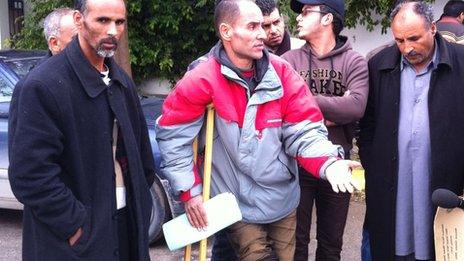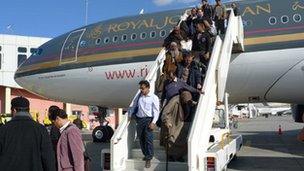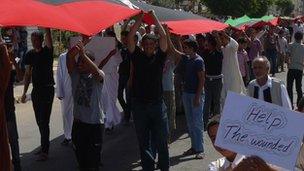Treatment plan for Libya war victims turns into scandal
- Published

Good connections are more likely to lead to treatment than real wounds
One of the first announcements made by Libya's National Transitional Council (NTC) after the fall of Tripoli last August was a promise to all those wounded in the fight against former leader Muammar Gaddafi.
The country's hospitals were overstretched, both by the number of casualties and by a shortage of staff caused by the flight of foreign workers.
Some of those with serious injuries could not be treated, and the first protests against the new administration were to demand that it do something for them.
The then-Prime Minister Mahmoud Jibril announced in September that the NTC would set aside $400m (£250m) to fund medical care for wounded fighters in overseas hospitals.
Initially this was handled by the Global Health Programme, an internationally-supervised scheme. By October it had been handed over to the transitional government.
Soon after that, Libyans began showing up at hospitals in Tunisia, Jordan, Turkey, Egypt, and some European countries.
Four months later, the scheme has been suspended. With no central oversight, it turns out it was being abused on a massive scale.
Lucky for some
The end of the conflict has reconnected Libya with the rest of the world, with international airlines steadily increasing the number of flights they operate to the main Libyan cities of Benghazi, Tripoli and Misrata.
Many of those flights are filled with Libyans seeking medical treatment abroad. They are one of the reasons cited by Royal Jordanian Airlines for augmenting its services to Libya. But very few of them appear to be wounded fighters.
Mustafa al-Ghoshti and his family were on one flight back from Amman.
He told me he had taken his wife and daughter to have their minor ailments treated in a Jordanian hospital, but was surprised to learn when he got there that his government would foot the bill for everything - hospital, flights, hotel, even some spending money.
"They gave us all the requirements - money, hotel bills," he told me. "There were committees in the hospitals there, former rebels, and we gave them the request for money from the government to help get treatment."
One doctor I spoke to said people had been coming to her asking for medical certificates even though there was nothing wrong with them. They wanted a free holiday.
She said one well-connected man had spent long periods in Tunisia getting physiotherapy, at the government's expense, for an ailment unrelated to the conflict.
Perverse incentives

Not all Libyans arriving in Jordan were wounded in battle
The new government appointed last November has now woken up to the scandal. Deputy Prime Minister Mustafa Abu Shagur has been given the job of sorting it out.
I asked him how much he thought the overseas health care scheme had cost so far.
"Eight hundred million dollars," he said. "We have around 40,000 people out of the country. If you talk about the wounded, I would say only 10 to 15% of them are wounded.
"Of course there may be other people who are sick and cannot be treated here, maybe 30% to 35%. But the others are not.
"And because of the financial incentives, some of them take maybe three of four family members with them."
The scheme was supposed to have been managed by the newly created Ministry of War Wounded.
In practice, though, the local committees set up in each area during the conflict have been allowed to decide who should benefit from the scheme.
Corruption and favouritism have inevitably crept in.
Expensive bills

Protests have demanded better treatment of the wounded
Now there is a new, national committee to handle the requests for overseas treatment. Outside the Tripoli villa which serves as its head office I met a crowd of men, in bandages or on crutches brandishing battered documents and X-ray scans.
These were the losers in the health-care scandal, lacking the right connections to powerful people.
Khaled al-Sakheer pulled up a trouser leg to show me his right foot, grotesquely twisted. He told me it has been shattered by a bullet during the uprising in Tripoli last August when his car was sprayed with gunfire.
He had been allocated a place at a foreign hospital by his local committee three months ago, he said, but at the last minute someone else was given his place.
He and fellow plaintiffs were not getting much joy from the new committee either. They besieged the single doctor who had arrived that morning, but he pleaded that he could not help them.
The rest of the committee were at an emergency meeting trying to decide what to do with the tainted scheme.
For now it has been suspended to allow an independent audit of how that $800m (£500m) was spent. Mr Abu Shagur says he has also asked the governments of countries where Libyans have been getting treatment to investigate the serious overcharging by private hospitals he believes has been taking place.
This has been an embarrassing and expensive scandal, at a time when the euphoria of the revolution has faded, and Libyans are beginning to ask tough questions about their government's performance.
CLARIFICATION, 11/02/2012: This article was amended to make clear that responsibility for the medical care scheme was handed over to the NTC in October.